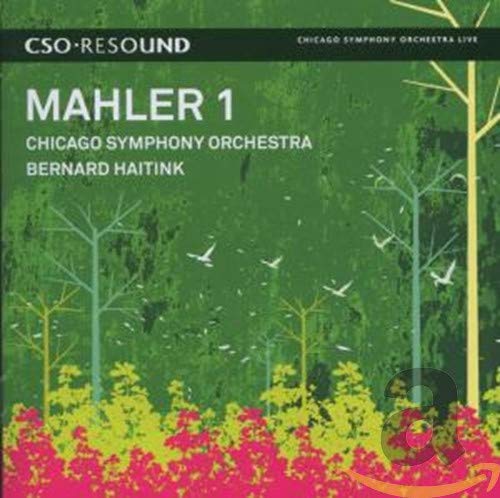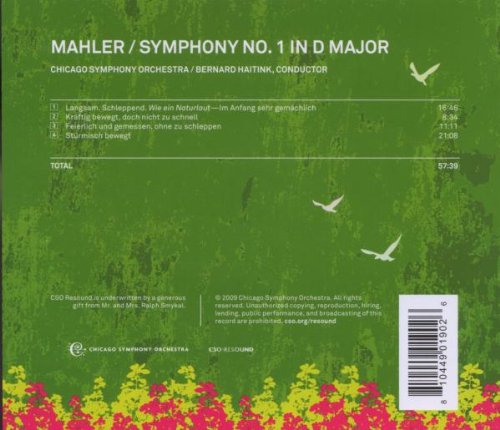Customer Services



An expert interpreter of Mahler's symphonies, CSO Principal Conductor Bernard Haitink leads the triumphant First Symphony, the work that introduced Mahler's staggering talent to the public.
F**D
Lifeless Mahler First
With perhaps a few exceptions, Bernard Haitink's recording career can be characterized as one of polished centrism, the most middle of middle-of-the-road offerings, to the point of blandness. Usually played well by the world class orchestras he led in these sessions (how can one go wrong with the Concertgebouw, the Chicago, etc.), the performances are rarely terrible, and just as rarely revelatory. The Haitink approach is appealing to a good number of listeners those who seek well executed, reliably consistent middle-of-the road interpretations, but it is disappointing to just as many who want more riveting experiences.This Mahler First begins in promising fashion. Haitink appropriately captures the mood of the first movement, which, according to the score, should be "Langsam schleppend, Immer sehr gemachlich"---slowly dragging, restrained throughout. Too few interpreters get this right (with Jascha Horenstein, Hermann Scherchen, and a few others among the few who do). The problem with Haitink is that, once past the main "Wayfarer" theme, the entire performance of this symphony, across almost all four movements, is "langsam schleppend"---lifeless and, as other reviewers have pointed out, zombie-like. It never emerges from half slumber. There is a lot of gray, little in the way of character, with long periods of non-activity. Even the fourth movement is heavy and boring. I prefer more deliberate Mahler Firsts to the herky-jerky lighter-weight variety, but this one is both dull and leaden. It is not the fault of the CSO, but the interpreter.Overall, it is a trying experience that may even bore Haitink's fans.
D**E
Underrated
This has turned into one of my favorite recordings of this great work. I didn't feel that way at first. As magnificent as the playing is, Haitink's gentle approach isn't something that makes you jump out of your seat after the first listen. There is no excess to be found -- no jarring tempo changes or sprints to the big climaxes in the first and fourth movements. It isn't to say one way is right and another is wrong, which is actually the point if you want to be open to appreciating more than just a single interpretation. In this case, Haitink's vision of the piece seems to be to let the music speak for itself and, generally speaking, to use very relaxed tempos that allow all the details to be heard. It's a similar concept to Celibidache's take on the Bruckner symphonies. I think it's especially effective in the first movement of Mahler 1, the sense of spaciousness and stillness of the opening bars conveyed in a way that makes the gradual awakening of nature and buildup to the big climax toward the end incredibly majestic. The second movement moves along at a moderate pace, the dance-like tune not too heavy, the trio section more reflective than jubilant. The third movement, as odd as the altered frere jacques theme is, gives way to the almost ethereal second tune, beautifully realized here by Haitink and the orchestra. The fourth movement erupts just as the quiet 3rd movement has barely faded away, and here the brass of the Chicago Symphony show a lot of punch and power. The percussion is equally effective, the only disappointment being a slight mistiming of the crash cymbal and bass drum during the final statement of the triumphant theme carried by the trumpets. The precise but lush strings and woodwinds create a perfect sense of nostalgia in the music quoted from the original second movement (Blumine), which Mahler deleted from the final edition. After that pastoral interlude before and after the storm, the CSO horns and trumpets slowly begin to summon the fanfare theme established in the first movement. From there, Haitink again opts for majestic rather than wild, leading the orchestra in a carefully paced but triumphant conclusion.
P**Y
Slow, steady, and confident
Haitink's Mahler No. 1 is slow. Slower than most. I have watched the Berlin Philharmonic one conducted by Haitink in early 1990s in DVD, and it sure enough was slow too, although it sounded a little more tense than this CSO one. I love Haitink style if it is slower (or maybe even duller) than Abbado's or Chailly's. His slow and steady style seems working really well particularly in accumulating the energy gradually but steadily, then exploding at once. And when it explodes, it does so mightily. Under Haitink's baton, Chicago Symphony aptly demonstrates the stark contrast with its fine skills and enormous stamina. When Haitink conducts, it seems that sound dynamic becomes more expansive and delicate all of a sudden - from pianissimo to fortissimo, and in most cases it works beautifully. Haitink's new Mahler might not be the best, even among his own recordings, but nonetheless, I love this one, including its sound quality, speed, and overall structure.
T**S
It Pleases Me
This version of Mahler's First Symphony has had variable reviews and write-ups in various publications and websites , since it's release .In my opinion however, it stands up there with the best .While my own particular favourites are Solti / LSO , and Kubelik / BSO , I feel that this is as good as any others .The sound , particularly in SACD mode , is terrific , and adds to what is a very good performance in my opinion.The CSO Resound label is to be commended on producing a fine product , and having also listened to the Second and Sixth symphonies by Haitink / CSO also , I can highly recommend them as well.
P**H
A slowly evolving interpretation: a muted formality with no spark or extra flair
Interpretación (57:39’) sin excesos en expresividad (nada de una procesión funeraria grotesca), dinámicas y tempi, de atención al detalle, de creciente confianza y poderío, de perfecto control en el flujo y reflujo de las corrientes emotivas con gracia y precisión y sin los excesos histriónicos que directores menos cultivados que Haitink no saben racionar en el finale. El director no incluye el movimiento rechazado por el compositor, Blumine e imparte un aire de melancolía sin parodias. Habrá quien considere esta interpretación demasiado ‘middle-of-the-road’ o practicando eso de "letting the music speak for itself", sobre todo aquellos que la vean como una obra revolucionaria, argumento basado en que es una obra contemporánea a Brahms y Dvorák y tan distinta.La actuación ‘live’ de la Chicago SO es admirable (¡qué percusión y metal!), técnicamente limpia y precisa, y la toma de sonido (James Mallinson) es espléndida y captamos el espacio acústico con transparencia de imágenes y el esplendor tonal de esa gran orquesta.
ア**ー
先入観なしで聴いてください
某アホな評論家が酷評したことで有名なハイティンクですが、このCD素晴らしいです。まずw録音が良い!広大なダイナミックレンジ、最強音でも歪みなく混濁しない分離感。半端ないです。演奏もなかなかと言うより名演の部類に入るのでないでしょうか。個人的にはバーンスタインより好みです。マーラー巨人はなかなか名演に巡り会えず、アバド、バーンスタインもいまいち。音質の悪いのを我慢してワルター版を愛聴してきました。ハイティンクは何もしない凡庸な指揮者だと?なことありませんよ。この演奏結構テンポ揺れますし、聴いていてある種の快感みたいなものを覚えます。まあシカゴ交響楽団の名人芸によるところも大きいですが、オーディオ的にも購入する価値があると思います。できれば広い部屋で音量大きめで聴くことをお勧めします。小型SPではちょっと辛いかもです。
山**真
超絶優秀録音!シカゴSO凄い!
CDとSHCDが出ています。音質にこだわるならSHCDでしょう。CDでも十分な高音質です。マーラーの入門CDとしてお勧めできます。オケもメッチャ上手いし、ハイティンクの堅実な指揮も好感が持てます。小難しいことを言わずに、音の洪水に埋もれてください。
C**A
同じシカゴでもショルティよりも好み
ショルティ盤をよく聴いていましたが、マルチで聴くと広がりが出て良いです。愛聴盤になりました。
Trustpilot
4 days ago
3 weeks ago